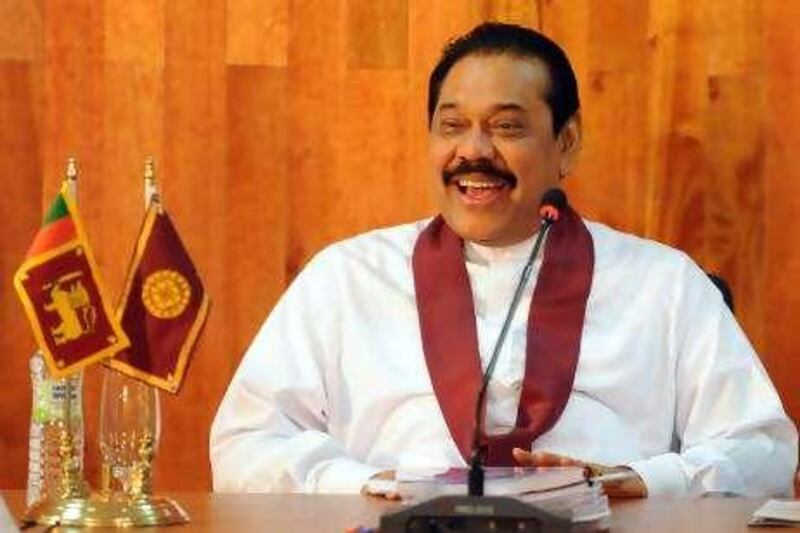COLOMBO // Sri Lankan President Mahinda Rajapaksa and Ranil Wickremesinghe, leader of the main opposition United National Party (UNP), agreed last week to work towards a prime-ministerial form of government, which would replace the 32-year-old executive presidency. Both Mr Rajapaksa's ruling party and the opposition UNP said they wanted to change the constitution and revert to a British-style parliamentary democracy with a prime minister as the head of government, the country's governing system before 1978.
However, critics and some lawmakers see the proposed change as no real change at all and simply an attempt by Mr Rajapaksa to hang on to power under a different title. Earlier this year, the president had declared in foreign media interviews his intention to seek a constitutional amendment to remove the restriction of two terms in office for a president. The aim was to allow him to contest for a third term after his second term ends in November 2016.
"He is abandoning plans to contest a third term as president but how sincere and genuine is he?" asked Wijedasa Rajapakse, a UNP legislator and leading constitutional lawyer. He said the president was forced to abandon plans for a third term because of international pressure, which is mounting over his persistent refusal to allow a United Nations panel to probe human-rights abuses, particularly during the last few months of the war against the Tamil Tigers in May 2009.
"We went for the discussions because we didn't want the public to say that the UNP is scuttling the process," the lawmaker said. He added, however, that if the executive prime minister proposal was a genuine attempt to reduce the powers of the president, then the opposition would provide its fullest support. Tamil parliamentarian Suresh Premachandran said the president and his allies were more interested in personal power and glory than resolving the far more important problems of minority Tamils.
"The constitution is being changed for family purposes. This is a big farce," he said. "The issues of the Tamils of language, religion, culture, land, security and meaningful devolution of power remain unresolved. "The government has nicely sidestepped the issues facing Tamils, and is concentrating on how to stay in power. They [the Rajapaksa family] are pursuing narrow political interests," he said.
The president's three brothers - Basil, the economic development minister; Gotabaya, the defence secretary; and Chamal, the parliamentary speaker - play influential roles in running the country. Namal, the president's son, was recently elected to parliament. "Our position has always been to abolish the executive presidential system, and there is some kind of national consensus on this," Vasudeva Nanayakkara, an MP from the Democratic Left Front, which is part of the ruling coalition, said in a telephone interview last week. He said he and other senior politicians in his party worried that the proposed constitutional reforms would extend the control of the Rajapaksa clan and leave no room for others.
"The president knows that if he allows his authority to be challenged, he would have problems. He doesn't want to leave space for a challenge," Mr Nanayakkara said, saying the proposed change "would be a crude version of the executive president with similar powers". Kusal Perera, a columnist with the Colombo-based Sunday Leader newspaper, said other senior politicians in the ruling party were also worried that the proposed constitutional reforms would extend the control of the Rajapaksa clan.
"The president knows that if he allows his authority to be challenged, he would have problems. He doesn't want to leave space for a challenge," Perera said, saying the proposed change "would be a crude version of the executive president with similar powers". He said the heated debate over the country's form of government indicates that the president is losing support for his autocratic rule. "Earlier none in the government outside the Rajapaksa family would challenge decisions by the president, particularly when the war was being fought, fearing they would be labeled unpatriotic. Now that the war is over, the cracks are showing," he said.
@Email:foreign.desk@thenational.ae





